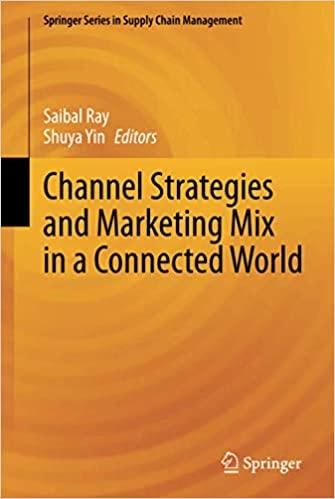Answered step by step
Verified Expert Solution
Question
1 Approved Answer
In 500+ words, discuss how the recommendations in the article of what a public leader should do in his everyday work life are connected to
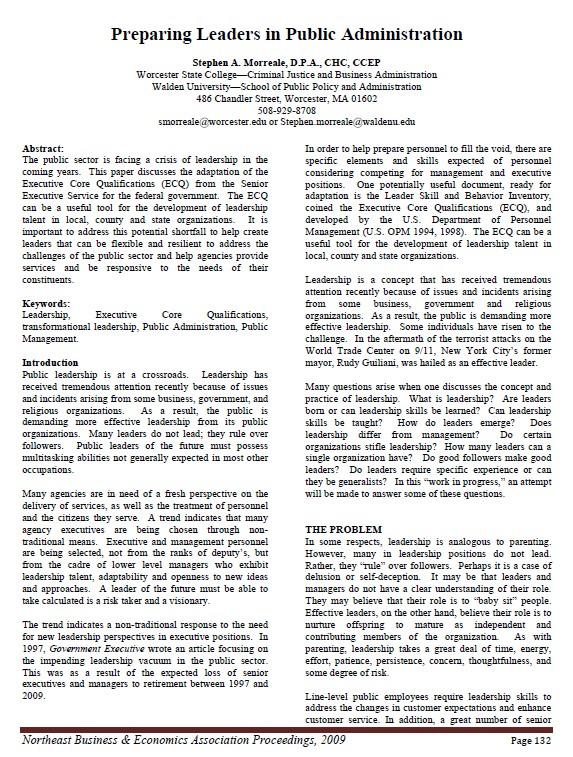
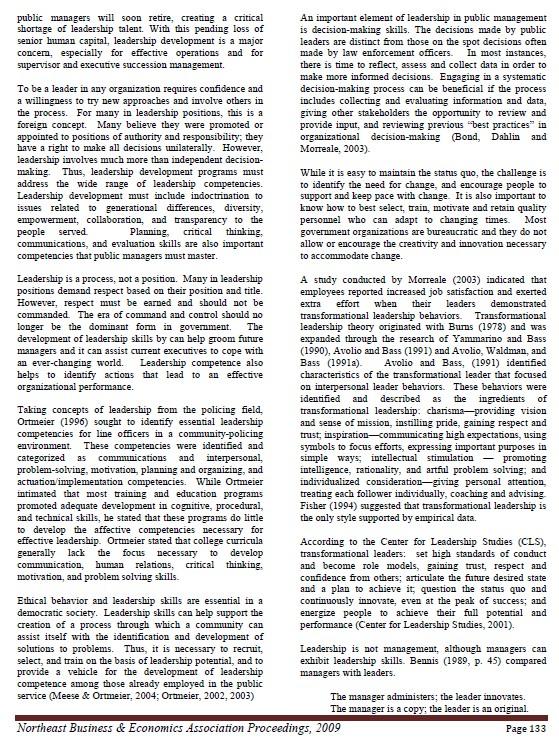
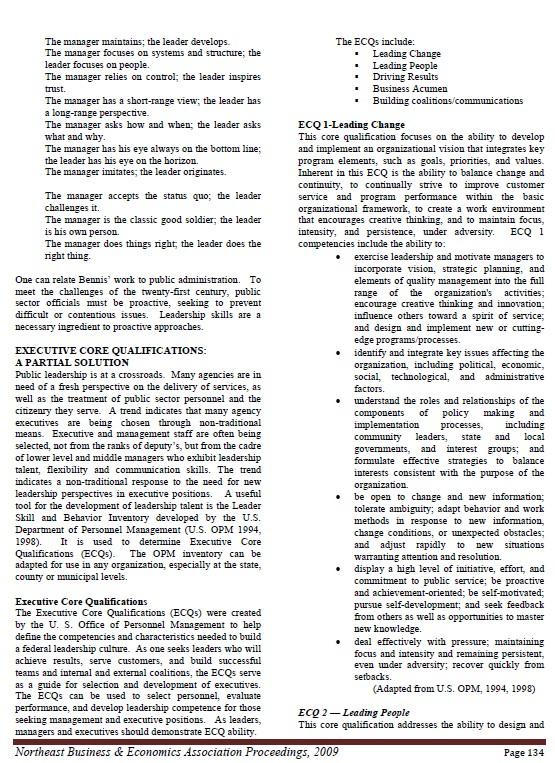
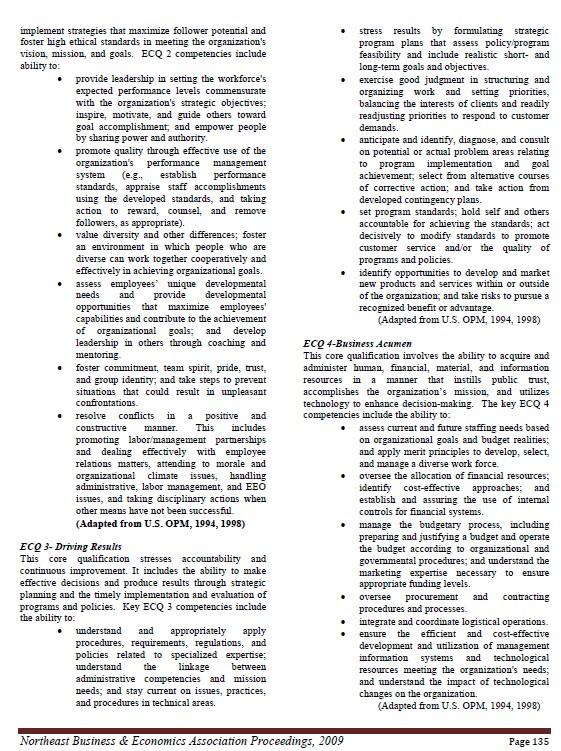
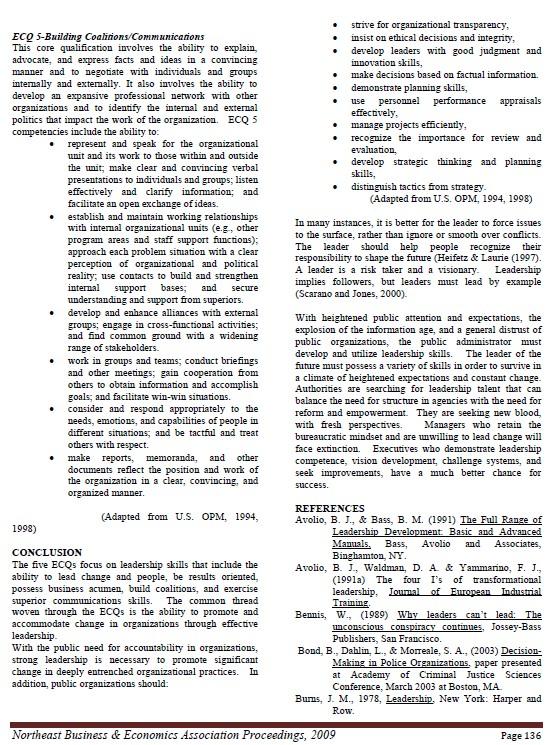
In 500+ words, discuss how the recommendations in the article of what a public leader should do in his everyday work life are connected to the management and leadership theories studied (Ex: Behaviorist, transactional, etc).
Stephen A. Morreale, D.P.A., CHC, CCEP Worcester State College-Criminal Justice and Business Administration Walden University-School of Public Policy and Administration 486 Chandler Street, Worcester, MA 01602 508-929-8708 smorreale a worcester.edu or Stephen morreale a waldenu.edu Abstract: In order to help prepare personnel to fill the void, there are The public sector is facing a crisis of leadership in the specific elements and skills expected of personnel coming years. This paper discusses the adaptation of the considering competing for management and executive Executive Core Qualifications (ECQ) from the Senior positions. One potentially useful document, ready for Executive Service for the federal goverument. The ECQ adaptation is the Leader Skill and Behavior Inventory, can be a useful tool for the development of leadership coined the Executive Core Qualifications (ECQ), and talent in local, county and state organizations. It is developed by the U.S. Department of Personnel important to address this potential shortfall to help create Management (U.S. OPM 1994, 1998). The ECQ can be a leaders that can be flexible and resilient to address the usefil tool for the development of leadership talent in challenges of the public sector and help agencies provide local, coumty and state organizations. services and be responsive to the needs of their constituents. Leadership is a concept that has received tremendous attention recently because of issues and incidents arising Keywords: from some business, goverument and religious Leadership, Executive Core Qualifications, organizations. As a result, the public is demanding more transformational leadership, Public Administration, Public effective leadership. Some individuals have risen to the Management. challenge. In the aftermath of the terrorist attacks on the Cis World Trade Center on 9/11, New York City's former Introduction mayor, Rudy Guiliani, was hailed as an effective leader. Public leadership is at a crossroads. Leadership has received tremendous attention recently because of issues Many questions arise when one discusses the concept and and incidents arising from some business, government, and practice of leadership. What is leadership? Are leaders religious organizations. As a result, the public is bom or can leadership skills be learned? Can leadership demanding more effective leadership from its public skills be taught? How do leaders emerge? Does organizations. Many leaders do not lead; they rule over leadership differ from management? Do certain followers. Public leaders of the future must possess organizations stifle leadership? How many leaders can a multitasking abilities not generally expected in most other single organization have? Do good followers make good occupations. leaders? Do leaders require specific experience or can they be generalists? In this "work in progress," an attempt Many agencies are in need of a fresh perspective on the will be made to answer some of these questions. delivery of services, as well as the treatment of personel and the citizens they serve. A trend indicates that many agency executives are being chosen through nonTHE PROBLEM traditional means. Executive and management personnel In some respects, leadership is analogous to parenting. are being selected, not from the ranks of deputy's, but However, many in leadership positions do not lead. from the cadre of lower level managers who exhibit Rather, they "rule" over followers. Perhaps it is a case of leadership talent, adaptability and openness to new ideas delusion or self-deception. It may be that leaders and and approaches. A leader of the furure must be able to managers do not have a clear understanding of their role. take calculated is a risk taker and a visionary. They may believe that their role is to "baby sit" people. Effective leaders, on the other hand, believe their role is to The trend indicates a non-trditional response to the need nuture offspring to mature as independent and for new leadership perspectives in executive positions. In contributing members of the organization. As with 1997, Goverment Executive wrote an article focusing on parenting, leadership takes a great deal of time, energy, the impending leadership vacuum in the public sector. effort, patience, persistence, concern, thonghtfulness, and This was as a result of the expected loss of senior some degree of risk. executives and managers to retirement between 1997 and 2009 Line-level public employees require leadership skills to address the changes in customer expectations and enbance customer service. In addition, a great number of senior Northeast Business \& Economics Association Proceedings, 2009 Page 132 The manager maintains; the leader develops. The ECQ5 include: The manager focuses on systems and structure; the - Leading Change leader focuses on people. - Leading People The manager relies on control; the leader inspires - Driving Results trust. - Business Acumen The manager has a short-range view; the leader has - Building coalitions/comunuications a long-range perspective. The manager asks how and when; the leader asks ECQ 1-Leading Change what and why. This core qualification focuses on the ability to develop The manager has his eye always on the bottom line; and implemeat an organizational vision that integrates key the leader has his eye on the horizon. program elements, such as goals, priorities, and values. The manager imitates; the leader originates. Inherent in this ECQ is the ability to balance change and The mazager accepts the status quo; the leader continuity, to continually strive to improve customer challenges it. service and program perfomance within the basic organizational framework, to create a work enviroument The manager does things right, the leader does the competencies include the ability to: right thing. - exercise leaderslip and motivate managers to incorporate vision, strategic planning, and One can relate Bennis' work to public administration. To elements of quality managemeut into the full meet the challenges of the twenty-first century, public range of the organization's activities; sector officials must be proactive, seeking to prevent encourage creative thinking and innovation; difficult or contentious issues. Leadership skills are a influence others toward a spirit of service; necessary ingredient to proactive approaches. and design and implement new or cuttingedge programs/processes. EXECUTIVE CORE QUALIFICATIONS: - identify and integrate key issues affecting the A PARTLAL SOLUTION need of a fresh perspective on the delivery of services, as factors. well as the treatment of public sector personnel and the - understand the roles and relationships of the citizeny they serve. A trend indicates that many agency components of policy making and executives are being chosen through non-traditional implementation processes, including means. Executive and management staff are often being community leaders, state and local selected, not from the ranks of deputy's, but from the cadre governmeats, and interest groups; and of lower level and middle managers who exhibit leadership formulate effective strategies to balance talent, flexibility and communication skills. The trend interests consistent with the purpose of the indicates a non-traditional response to the need for new organization. leadership perspectives in executive positions. A useful - be open to change and new information; tool for the development of leadership talent is the Leader tolerate ambiguity; adapt behavior and work Skill and Behavior Inventory developed by the U.S. methods in response to new information, Deparment of Personnel Management (U.S. OPM 1994, change conditions, or unexpected obstacles; 1998). It is used to determine Executive Core and adjust rapidly to new situations Qualifications (ECQs). The OPM inventory can be warranting attention and resolution. adapted for use in any orgamization, especially at the state, - display a high level of initiative, effort, and county or municipal levels. commitment to public service; be proactive and achievement-oriented; be self-motivated; Erecutive Core Qualifications _ pursue self-development; and seek feedback The Executive Core Qualifications ( ECQ ) were created from others as well as opportunities to master by the U. S. Office of Personnel Management to belp new knowledge. define the competencies and characteristics needed to build - deal effectively with pressure; maintaining a federal leadership culture. As one seeks leaders who will focus and intensity and remaining persistent, achieve results, serve customers, and build successful even under adversity; recover quickly from teams and internal and external coalitions, the ECQ serve setbacks. as a guide for selection and development of executives. (Adapted from U.S. OPM, 1994, 1998) The ECQs can be used to select personnel, evaluate performance, and develop leadership competence for those ECQ 2 - Leading People seeking management and executive positions. As leaders, This core qualification addresses the ability to design and managers and executives should demonstrate ECQ ability. Northeast Business \& Economics Association Proceedings, 2009 Page 134 implement strategies that maximize follower potential and - 5tres5 results by formulating strategic foster high ethical standards in meeting the organization's program plans that assess policylprogram vision, mission, and goals. ECQ 2 competencies include feasibility and include realistic short- and ability to: long-tem goals and objectives. - provide leadership in setting the workforce's - exercise good judgment in structuring and expected performance levels commensurate organizing work and setting priorities, with the organization's strategic objectives; balancing the interests of clients and readily inspire, motivate, and guide others toward readjusting priorities to respond to customer goal accomplishment, and empower people demands. by sharing power and authority. - anticipate and identify, diagnose, and consult - promote quality through effective use of the on potential or actual problem areas relating organization's performance management system (e.g., establish performance lo program implementation and goal standards, appraise staff accomplishments of corrective action; and take action from using the developed standards, and taking developed contingency plans. action to reward, comsel, and remove - 5et program standards; hold self and others followers, as appropriate). accountable for achieving the standards; act - value diversity and other differences; foster decisively to modify standards to promote an environment in which people who are customer service andior the quality of diverse can work together cooperatively and programs and policies. effectively in achieving organizational goals. - identify opportunities to develop and market - assess employees' unique developmental new products and services within or outside needs and provide developmental of the organization; and take risks to pursue a opportumities that maximize employees' recognized benefit or advantage. capabilities and contribute to the achievement (Adapted from U.S. OPM, 1994, 1998) of organizational goals; and develop leadership in others through coaching and ECQ 4-Business Acumen mentoring. - foster commitment, team spirit, pride, trust, administer human, financial, material, and information and group identity, and take steps to prevent resources in a manner that instills public trust, situations that could result in umpleasant accomplishes the organization's mission, and utilizes confrontations. technology to enhance decision-making. The key ECQ 4 - resolve conflicts in a positive and competencies include the ability to: constructive manner. This includes - assess current and future staffing needs based promoting labor/management parmerships on organizational goals and budget realities: and dealing effectively with employee and apply merit principles to develop, select, relations matters, attending to morale and and manage a diverse work force. organizational climate issues, handling - oversee the allocation of financial resources; administrative, labor management, and EEO identify cost-effective approaches; and issues, and taking disciplinary actions when establish and assuring the use of internal other means have not been successfiul. controls for financial systems. (Adapted from U.S. OPM, 1994, 1998) - manage the budgetary process, including preparing and justifying a budget and operate ECQ 3-Driving Resulits the budget according to organizational and This core qualification stresses accountability and governmental procedures; and understand the continuous improvement. It includes the ability to make marketing expertise necessary to ensure effective decisions and produce results through strategic appropriate funding levels. planning and the timely implementation and evaluation of - oversee procurement and contracting programs and policies. Key ECQ 3 competencies include procedures and processes. the ability to: - integrate and coordinate logistical operations. - understand and appropriately apply - ensure the efficient and cost-effective procedures, requirements, regulations, and development and utilization of management policies related to specialized expertise; information systems and technological understand the linkage between resources meeting the organization's needs; administrative competencies and mission and understand the impact of technological needs; and stay current on issues, practices, changes on the organization. and procedures in technical areas. (Adapted from U.S. OPM, 1994, 1998) Northeast Business \& Economics Association Proceedings, 2009 Page 135 - 5trive for organizational transparency, ECQ 5-Building Coalitions/Communications - insist on ethical decisions and integrity, This core qualification involves the ability to explain, - develop leaders with good judgment and advocate, and express facts and ideas in a convincing imnovation sikills, manner and to negotiate with individuals and groups - make decisions based on factual information. intemally and externally. It also involves the ability to - demonstrate planning skills, develop an expansive professional network with other - use personnel performance appraisals organizations and to identify the internal and external effectively. politics that impact the work of the organization. ECQ5 competencies include the ability to: - manage projects efficiently, - recognize the importance for review and - represent and speak for the organizational unit and its work to those within and outside evaluation. the unit; make clear and convincing verbal - develop strategic thinking and planning skills, presentations to individuals and groups; listen effectively and clarify information; and - distinguish tactics from strategy. facilitate an open exchange of ideas. (Adapted from U.S. OPM, 1994, 1998) - establish and maintain working relationships with intemal organizational units (e.g, other In many instances, it is better for the leader to force issues program areas and staff support functions); approach each problem situation with a clear The leader should belp people recognize their perception of organizational and political responsibility to shape the furure (Heifetz & Laurie (1997). reality, use contacts to build and strengthen A leader is a risk taker and a visionary. Leadership internal support bases; and secure implies followers, but leaders must lead by example understanding and support from superiors. (Scarano and Jones, 2000). - develop and evhance alliances with external groups; engage in cross-functional activities; With heightened public attention and expectations, the and find common ground with a widening explosion of the information age, and a general distrust of range of stakeholders. public organizations, the public administrator must - work in groups and teams; conduct briefings develop and utilize leadership skills. The leader of the and other meetings; gain cooperation from future must possess a variety of skills in order to survive in others to obtain information and accomplish a climate of heightened expectations and constant change. goals; and facilitate win-win situations. Authorities are searching for leadership talent that can - consider and respond appropriately to the balance the need for structure in agencies with the need for needs, emotions, and capabilities of people in reform and empowerment. They are seeling new blood, different situations; and be tactfil and treat with fresh perspectives. Managers who retain the - make reports, memoranda, and other face extinction. Executives who demonstrate leadership documents reflect the position and work of competence, vision development, challenge systems, and documents reflect the position and work of seek improvements, have a much better chance for the organization in a clear, convincing, and succes5. organized manner. REFERENCES (Adapted from U.S. OPM, 1994, Avolio, B. J., \& Bass, B. M. (1991) The Full Range of 1998) Leadership Development Basic and Advanced Manuals, Bass, Avolio and Associates, CONCLUSION Binghamton, NY. The five ECQ5 focus on leadership skills that include the Avolio, B. J., Waldman, D. A. \& Yammarino, F. J., ability to lead change and people, be results oriented, (1991a) The four I's of transformational possess business acumen, build coalitions, and exercise leadership, Ioumal of European Industrial Stephen A. Morreale, D.P.A., CHC, CCEP Worcester State College-Criminal Justice and Business Administration Walden University-School of Public Policy and Administration 486 Chandler Street, Worcester, MA 01602 508-929-8708 smorreale a worcester.edu or Stephen morreale a waldenu.edu Abstract: In order to help prepare personnel to fill the void, there are The public sector is facing a crisis of leadership in the specific elements and skills expected of personnel coming years. This paper discusses the adaptation of the considering competing for management and executive Executive Core Qualifications (ECQ) from the Senior positions. One potentially useful document, ready for Executive Service for the federal goverument. The ECQ adaptation is the Leader Skill and Behavior Inventory, can be a useful tool for the development of leadership coined the Executive Core Qualifications (ECQ), and talent in local, county and state organizations. It is developed by the U.S. Department of Personnel important to address this potential shortfall to help create Management (U.S. OPM 1994, 1998). The ECQ can be a leaders that can be flexible and resilient to address the usefil tool for the development of leadership talent in challenges of the public sector and help agencies provide local, coumty and state organizations. services and be responsive to the needs of their constituents. Leadership is a concept that has received tremendous attention recently because of issues and incidents arising Keywords: from some business, goverument and religious Leadership, Executive Core Qualifications, organizations. As a result, the public is demanding more transformational leadership, Public Administration, Public effective leadership. Some individuals have risen to the Management. challenge. In the aftermath of the terrorist attacks on the Cis World Trade Center on 9/11, New York City's former Introduction mayor, Rudy Guiliani, was hailed as an effective leader. Public leadership is at a crossroads. Leadership has received tremendous attention recently because of issues Many questions arise when one discusses the concept and and incidents arising from some business, government, and practice of leadership. What is leadership? Are leaders religious organizations. As a result, the public is bom or can leadership skills be learned? Can leadership demanding more effective leadership from its public skills be taught? How do leaders emerge? Does organizations. Many leaders do not lead; they rule over leadership differ from management? Do certain followers. Public leaders of the future must possess organizations stifle leadership? How many leaders can a multitasking abilities not generally expected in most other single organization have? Do good followers make good occupations. leaders? Do leaders require specific experience or can they be generalists? In this "work in progress," an attempt Many agencies are in need of a fresh perspective on the will be made to answer some of these questions. delivery of services, as well as the treatment of personel and the citizens they serve. A trend indicates that many agency executives are being chosen through nonTHE PROBLEM traditional means. Executive and management personnel In some respects, leadership is analogous to parenting. are being selected, not from the ranks of deputy's, but However, many in leadership positions do not lead. from the cadre of lower level managers who exhibit Rather, they "rule" over followers. Perhaps it is a case of leadership talent, adaptability and openness to new ideas delusion or self-deception. It may be that leaders and and approaches. A leader of the furure must be able to managers do not have a clear understanding of their role. take calculated is a risk taker and a visionary. They may believe that their role is to "baby sit" people. Effective leaders, on the other hand, believe their role is to The trend indicates a non-trditional response to the need nuture offspring to mature as independent and for new leadership perspectives in executive positions. In contributing members of the organization. As with 1997, Goverment Executive wrote an article focusing on parenting, leadership takes a great deal of time, energy, the impending leadership vacuum in the public sector. effort, patience, persistence, concern, thonghtfulness, and This was as a result of the expected loss of senior some degree of risk. executives and managers to retirement between 1997 and 2009 Line-level public employees require leadership skills to address the changes in customer expectations and enbance customer service. In addition, a great number of senior Northeast Business \& Economics Association Proceedings, 2009 Page 132 The manager maintains; the leader develops. The ECQ5 include: The manager focuses on systems and structure; the - Leading Change leader focuses on people. - Leading People The manager relies on control; the leader inspires - Driving Results trust. - Business Acumen The manager has a short-range view; the leader has - Building coalitions/comunuications a long-range perspective. The manager asks how and when; the leader asks ECQ 1-Leading Change what and why. This core qualification focuses on the ability to develop The manager has his eye always on the bottom line; and implemeat an organizational vision that integrates key the leader has his eye on the horizon. program elements, such as goals, priorities, and values. The manager imitates; the leader originates. Inherent in this ECQ is the ability to balance change and The mazager accepts the status quo; the leader continuity, to continually strive to improve customer challenges it. service and program perfomance within the basic organizational framework, to create a work enviroument The manager does things right, the leader does the competencies include the ability to: right thing. - exercise leaderslip and motivate managers to incorporate vision, strategic planning, and One can relate Bennis' work to public administration. To elements of quality managemeut into the full meet the challenges of the twenty-first century, public range of the organization's activities; sector officials must be proactive, seeking to prevent encourage creative thinking and innovation; difficult or contentious issues. Leadership skills are a influence others toward a spirit of service; necessary ingredient to proactive approaches. and design and implement new or cuttingedge programs/processes. EXECUTIVE CORE QUALIFICATIONS: - identify and integrate key issues affecting the A PARTLAL SOLUTION need of a fresh perspective on the delivery of services, as factors. well as the treatment of public sector personnel and the - understand the roles and relationships of the citizeny they serve. A trend indicates that many agency components of policy making and executives are being chosen through non-traditional implementation processes, including means. Executive and management staff are often being community leaders, state and local selected, not from the ranks of deputy's, but from the cadre governmeats, and interest groups; and of lower level and middle managers who exhibit leadership formulate effective strategies to balance talent, flexibility and communication skills. The trend interests consistent with the purpose of the indicates a non-traditional response to the need for new organization. leadership perspectives in executive positions. A useful - be open to change and new information; tool for the development of leadership talent is the Leader tolerate ambiguity; adapt behavior and work Skill and Behavior Inventory developed by the U.S. methods in response to new information, Deparment of Personnel Management (U.S. OPM 1994, change conditions, or unexpected obstacles; 1998). It is used to determine Executive Core and adjust rapidly to new situations Qualifications (ECQs). The OPM inventory can be warranting attention and resolution. adapted for use in any orgamization, especially at the state, - display a high level of initiative, effort, and county or municipal levels. commitment to public service; be proactive and achievement-oriented; be self-motivated; Erecutive Core Qualifications _ pursue self-development; and seek feedback The Executive Core Qualifications ( ECQ ) were created from others as well as opportunities to master by the U. S. Office of Personnel Management to belp new knowledge. define the competencies and characteristics needed to build - deal effectively with pressure; maintaining a federal leadership culture. As one seeks leaders who will focus and intensity and remaining persistent, achieve results, serve customers, and build successful even under adversity; recover quickly from teams and internal and external coalitions, the ECQ serve setbacks. as a guide for selection and development of executives. (Adapted from U.S. OPM, 1994, 1998) The ECQs can be used to select personnel, evaluate performance, and develop leadership competence for those ECQ 2 - Leading People seeking management and executive positions. As leaders, This core qualification addresses the ability to design and managers and executives should demonstrate ECQ ability. Northeast Business \& Economics Association Proceedings, 2009 Page 134 implement strategies that maximize follower potential and - 5tres5 results by formulating strategic foster high ethical standards in meeting the organization's program plans that assess policylprogram vision, mission, and goals. ECQ 2 competencies include feasibility and include realistic short- and ability to: long-tem goals and objectives. - provide leadership in setting the workforce's - exercise good judgment in structuring and expected performance levels commensurate organizing work and setting priorities, with the organization's strategic objectives; balancing the interests of clients and readily inspire, motivate, and guide others toward readjusting priorities to respond to customer goal accomplishment, and empower people demands. by sharing power and authority. - anticipate and identify, diagnose, and consult - promote quality through effective use of the on potential or actual problem areas relating organization's performance management system (e.g., establish performance lo program implementation and goal standards, appraise staff accomplishments of corrective action; and take action from using the developed standards, and taking developed contingency plans. action to reward, comsel, and remove - 5et program standards; hold self and others followers, as appropriate). accountable for achieving the standards; act - value diversity and other differences; foster decisively to modify standards to promote an environment in which people who are customer service andior the quality of diverse can work together cooperatively and programs and policies. effectively in achieving organizational goals. - identify opportunities to develop and market - assess employees' unique developmental new products and services within or outside needs and provide developmental of the organization; and take risks to pursue a opportumities that maximize employees' recognized benefit or advantage. capabilities and contribute to the achievement (Adapted from U.S. OPM, 1994, 1998) of organizational goals; and develop leadership in others through coaching and ECQ 4-Business Acumen mentoring. - foster commitment, team spirit, pride, trust, administer human, financial, material, and information and group identity, and take steps to prevent resources in a manner that instills public trust, situations that could result in umpleasant accomplishes the organization's mission, and utilizes confrontations. technology to enhance decision-making. The key ECQ 4 - resolve conflicts in a positive and competencies include the ability to: constructive manner. This includes - assess current and future staffing needs based promoting labor/management parmerships on organizational goals and budget realities: and dealing effectively with employee and apply merit principles to develop, select, relations matters, attending to morale and and manage a diverse work force. organizational climate issues, handling - oversee the allocation of financial resources; administrative, labor management, and EEO identify cost-effective approaches; and issues, and taking disciplinary actions when establish and assuring the use of internal other means have not been successfiul. controls for financial systems. (Adapted from U.S. OPM, 1994, 1998) - manage the budgetary process, including preparing and justifying a budget and operate ECQ 3-Driving Resulits the budget according to organizational and This core qualification stresses accountability and governmental procedures; and understand the continuous improvement. It includes the ability to make marketing expertise necessary to ensure effective decisions and produce results through strategic appropriate funding levels. planning and the timely implementation and evaluation of - oversee procurement and contracting programs and policies. Key ECQ 3 competencies include procedures and processes. the ability to: - integrate and coordinate logistical operations. - understand and appropriately apply - ensure the efficient and cost-effective procedures, requirements, regulations, and development and utilization of management policies related to specialized expertise; information systems and technological understand the linkage between resources meeting the organization's needs; administrative competencies and mission and understand the impact of technological needs; and stay current on issues, practices, changes on the organization. and procedures in technical areas. (Adapted from U.S. OPM, 1994, 1998) Northeast Business \& Economics Association Proceedings, 2009 Page 135 - 5trive for organizational transparency, ECQ 5-Building Coalitions/Communications - insist on ethical decisions and integrity, This core qualification involves the ability to explain, - develop leaders with good judgment and advocate, and express facts and ideas in a convincing imnovation sikills, manner and to negotiate with individuals and groups - make decisions based on factual information. intemally and externally. It also involves the ability to - demonstrate planning skills, develop an expansive professional network with other - use personnel performance appraisals organizations and to identify the internal and external effectively. politics that impact the work of the organization. ECQ5 competencies include the ability to: - manage projects efficiently, - recognize the importance for review and - represent and speak for the organizational unit and its work to those within and outside evaluation. the unit; make clear and convincing verbal - develop strategic thinking and planning skills, presentations to individuals and groups; listen effectively and clarify information; and - distinguish tactics from strategy. facilitate an open exchange of ideas. (Adapted from U.S. OPM, 1994, 1998) - establish and maintain working relationships with intemal organizational units (e.g, other In many instances, it is better for the leader to force issues program areas and staff support functions); approach each problem situation with a clear The leader should belp people recognize their perception of organizational and political responsibility to shape the furure (Heifetz & Laurie (1997). reality, use contacts to build and strengthen A leader is a risk taker and a visionary. Leadership internal support bases; and secure implies followers, but leaders must lead by example understanding and support from superiors. (Scarano and Jones, 2000). - develop and evhance alliances with external groups; engage in cross-functional activities; With heightened public attention and expectations, the and find common ground with a widening explosion of the information age, and a general distrust of range of stakeholders. public organizations, the public administrator must - work in groups and teams; conduct briefings develop and utilize leadership skills. The leader of the and other meetings; gain cooperation from future must possess a variety of skills in order to survive in others to obtain information and accomplish a climate of heightened expectations and constant change. goals; and facilitate win-win situations. Authorities are searching for leadership talent that can - consider and respond appropriately to the balance the need for structure in agencies with the need for needs, emotions, and capabilities of people in reform and empowerment. They are seeling new blood, different situations; and be tactfil and treat with fresh perspectives. Managers who retain the - make reports, memoranda, and other face extinction. Executives who demonstrate leadership documents reflect the position and work of competence, vision development, challenge systems, and documents reflect the position and work of seek improvements, have a much better chance for the organization in a clear, convincing, and succes5. organized manner. REFERENCES (Adapted from U.S. OPM, 1994, Avolio, B. J., \& Bass, B. M. (1991) The Full Range of 1998) Leadership Development Basic and Advanced Manuals, Bass, Avolio and Associates, CONCLUSION Binghamton, NY. The five ECQ5 focus on leadership skills that include the Avolio, B. J., Waldman, D. A. \& Yammarino, F. J., ability to lead change and people, be results oriented, (1991a) The four I's of transformational possess business acumen, build coalitions, and exercise leadership, Ioumal of European IndustrialStep by Step Solution
There are 3 Steps involved in it
Step: 1

Get Instant Access to Expert-Tailored Solutions
See step-by-step solutions with expert insights and AI powered tools for academic success
Step: 2

Step: 3

Ace Your Homework with AI
Get the answers you need in no time with our AI-driven, step-by-step assistance
Get Started


